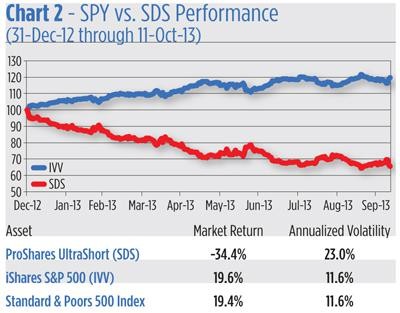UPDATE More Equity Hedge Funds Are Shorting ETFs Rather Than Stocks
Post on: 12 Июнь, 2015 No Comment

SAN FRANCISCO (Dow Jones) — Some equity hedge funds have quit short selling stocks because the strategy is riskier in a rising market and has become too crowded to be profitable. Instead, more managers are shorting exchange-traded funds.
That’s a problem, according to some experts, who argue that using ETFs to hedge equity portfolios is a poor substitute for the real thing. Others say the trend shows managers are adapting to a trying environment for short sellers.
Short selling involves borrowing a stock and then selling it. If the shares fall, the trader can buy them back at a lower price and return them to the lender at the original price. The difference is kept as profit.
The managers of equity hedges sell stocks short to protect their portfolios from stock-market declines and to help them generate alpha — industry parlance for extra returns, above what’s available from the market.
When stock markets rise, as they have been doing recently, short selling becomes more difficult. Short sellers tracked by Hedge Fund Research lost 7.42% through April this year. The Standard & Poor’s 500 index was up roughly 5% during the first four months of 2007.
But some investors and managers say a rising stock market isn’t the sole issue. The rapid growth of the hedge-fund industry and the leveraged-buyout boom are also making the practice of shorting stocks less attractive.
The single-stock-shorting game has become absolutely treacherous, said
Jeff Bernstein
, co-founder and managing director of hedge fund Keel Capital Management LLC. Because of the growth of hedge funds, there just aren’t that many companies available to short now — competition for shares to borrow has gotten intense.
Bernstein and colleagues shut down Keel at the end of February partly because of a lack of attractive short-sale opportunities. Without good short ideas, Keel often had to trim its long positions to keep the fund within its strict strategy parameters.
Keel also refrained from using ETFs to hedge its portfolio because that strategy can inflate losses when stock markets fall, Bernstein said. It can also be a duller tool, leaving managers betting against good companies that happen to be in an index alongside more troubled rivals, he added.
Shorting ETFs
Still, facing investment headwinds, an increasing number of equity hedge funds are shorting ETFs instead of single stocks. ETFs are indexed baskets of securities that, like shares, trade on exchanges throughout the day. They can be sold short or bought on margin, and many have listed options.
Given Keel’s problems, Bernstein said that if he were starting a hedge fund today, he would absolutely give the vehicle more leeway and allow it to short ETFs.
ETF short interest has jumped 44% to $85 billion since the end of 2006, Paul Mazzilli of Morgan Stanley (NYSE:MS) (MS) wrote in a note to clients in late April.
There are eight ETFs with short interest greater than 100%, indicating more shares are being shorted than are outstanding, he reported.














